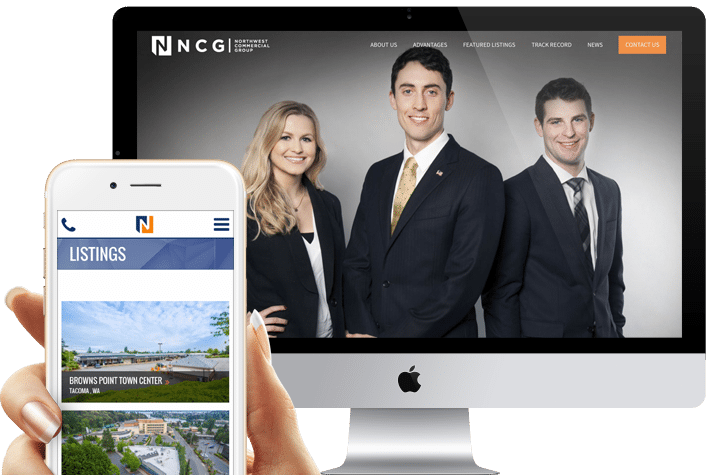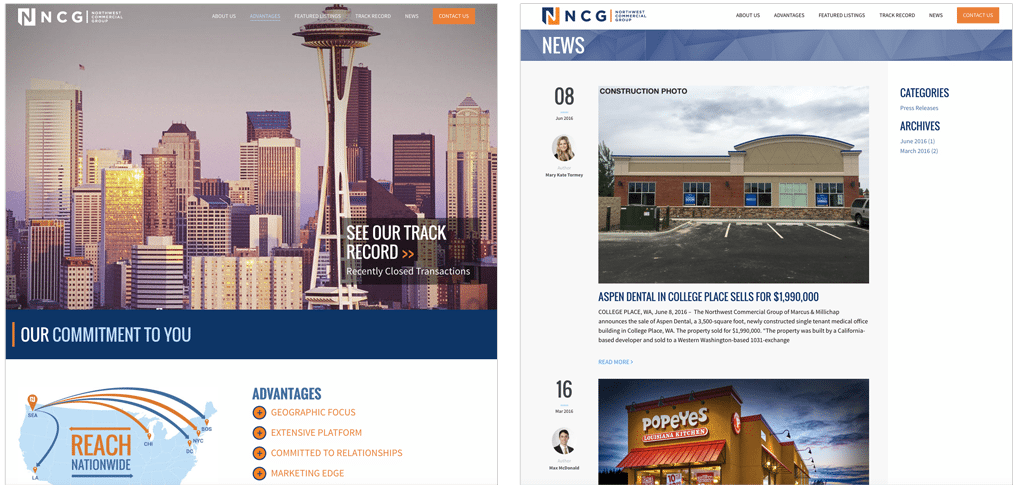Build a Strong Foundational Strategy
Whether you’re in commercial or residential real estate, your website needs to be built purposefully to drive visitors to the final conversion. Before you put up the frames or slap the paint on, everything needs to be resting on a stable foundation. Each section of your website should lead naturally to the next, and there should be a path of pages for every type of visitor—real estate buyers, real estate sellers, mortgage providers, and all the vendors in-between. Every audience needs value propositions and incentives to continue to the point where they fill in a form, make a call, or schedule a meeting.

Create Curb Appeal with Professional Branding
A modern real estate website needs up-to-date branding with a professional touch. In a crowded market where customers could work with any team, don’t blow that first impression. Invest in rock solid visual branding, and you’ll be collecting returns for years to come. Next, make sure your real estate web design Seattle team knows how to decorate the site with the brand—the color scheme, the fonts, and the styling should all convey what kind of firm you’re running and that you’re absolutely worth your percentage. Don’t forget that branding includes the voice—each line of copy is a representation of who you are and what you’re like to work with, so make sure to show off all your charm throughout.

Show Off Your Friendly Team
Half the difference between real estate firms is their people, so make sure your team has a place to shine on your website, like the About page. It’s a good idea to give them a little personality, too, including hobbies, a quick bio, and a photo—you could even have one professional one, and one lighthearted one each. Anything that can help your frontline team connect with customers is a plus. It’s also important to note that stock photos are always easy to spot, so invest in a photoshoot around the office and team headshots if you can.

Compete Against Market Leaders with Professional Web Development
Whether your real estate firm is a local residential team, a regional commercial player, or even one of the largest firms in the nation, you’ll have some stiff competition from internet-first companies like Redfin and Zillow. Most customers will compare your website’s ease-of-use and value to expectations set by those slick, well-designed, and highly functional sites. You need web developers who can build a real estate site that performs. You should be concerned with the ease of browsing your property inventory, the loading time of each page, and the mobile responsiveness, i.e. how nicely the site displays on smartphones and tablets.
Put Your Firm on the Map with Local SEO
A great real estate website is useless if nobody can find it. Put SEO (search engine optimization) tactics into place, including sharing on social media, using industry keywords liberally, and keeping a frequently-updated blog. You could write about the goings on of the real estate industry, and about the problems that your customers face to help demonstrate your knowledge. If you’re highly localized in one city or county, you could create articles on regulations and laws that affect commercial real estate, and the ROI of investment properties. Having lots of high-quality content relevant to your area and services on the site works to boost your search rankings, making it more likely you’ll show up for key terms like “[your city] commercial real estate.”

Generate Word of Mouth with Outstanding Reviews
Most professional services firms live and die by their reputation, but why wait for someone to make an in-person referral? Collect reviews from happy customers and vendors at the end of successful deals on your Google My Business page, and your social media accounts. Getting the reviews on Google also helps people find your firm faster, helping with local SEO too. Be the 5 star real estate company you were meant to be.











